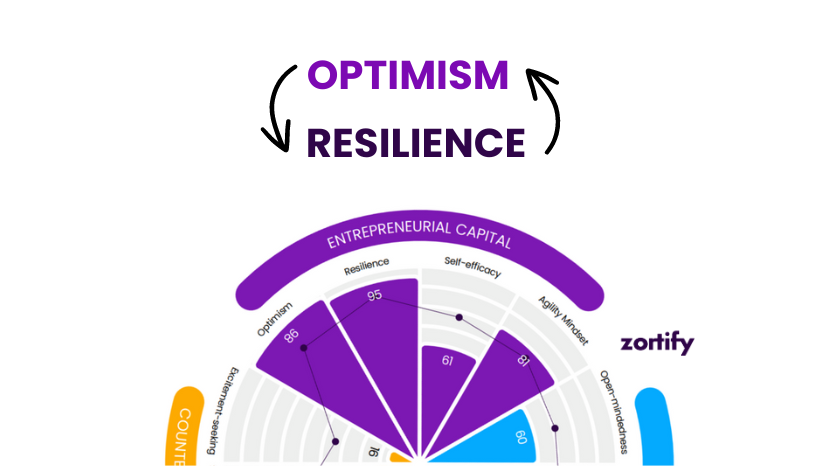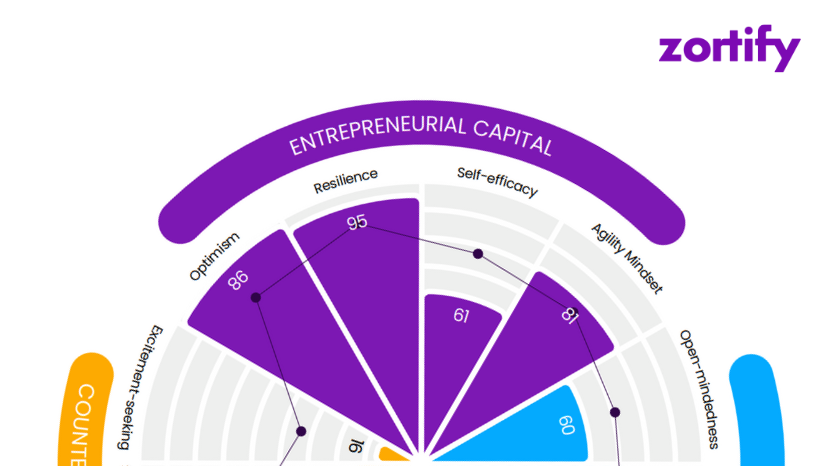How to find and promote optimistic and resilient employees
Today’s working world puts the resilience and optimism of many people to the test. Digitalisation and automation require employees to regularly adapt to new technologies and working conditions. This calls not only for flexibility, but also emotional stability. According to the ‘State of the Global Workplace’ report by Gallup (2022), 44% of employees worldwide stated that they are under stress every day. Burnout rates continue to rise. A survey by the McKinsey Global Institute (2021) found that 42% of employees are concerned about workplace stress and its impact on their mental health. Added to this are the numerous global crises that are affecting people’s psychological well-being.
Those who are optimistic tend to be more resilient
We admit the numbers do not exactly scream “Feel positive!”. This makes it all the more important for companies to focus more on resilience and optimism as characteristics.
Resilience refers to the ability to overcome setbacks and difficult situations without falling apart. Resilient people always find the strength to recover and emerge stronger from crises. They remain focussed on their goals even in the face of difficulties and tend to learn from past experiences and use this knowledge to master future tasks.
Optimism, on the other hand, describes the ability to see challenges as opportunities for growth and further development. Optimistic people have a positive attitude that makes it easier for them to deal with obstacles. Through their optimistic view of the future, they can overcome fears and inspire others to take action, even those who may doubt or hesitate.
While these two characteristics are independent aspects they can also reinforce each other. In combination with a strong sense of self-efficacy, people with a positive attitude to life are more likely to trust in their ability to overcome problems, even in difficult situations. Studies show that optimistic people react more resiliently to stressful situations.
The positive consequences of positive thinking
Companies that specifically hire optimistic and resilient people benefit on several levels:
- Performance and productivity: resilient and optimistic employees remain productive even under pressure and overcome challenges more easily. They are more flexible and have a high frustration tolerance, which is an advantage in times of constant change. A study by McKinsey shows that companies that implement targeted resilience programmes achieve a 22% increase in employee satisfaction and productivity.
- Cost efficiency: Companies save costs in the long term, as employees with these characteristics are less likely to be absent due to illness and have a lower risk of developing burnout. According to a study by Deloitte, companies can reduce sick leave by up to 29% by implementing programmes to promote resilience.
- Innovative spirit: Optimistic employees see problems as challenges and develop creative solutions. A study by PwC shows that companies with more resilient teams are 1.5 times more likely to develop innovative products and solutions than companies with less resilient teams.
- Positive team dynamics: Teams made up of resilient and optimistic members are able to resolve conflicts better and work together more efficiently. These employees contribute to a positive working atmosphere that strengthens the entire team.
Finding optimistic and resilient employees with AI
AI can help companies recognise and promote optimism and resilience in (potential) employees in a number of ways. When recruiting, AI-supported systems can analyze application documents, social media profiles and work samples to find indications of resilience and optimism. AI-based personality diagnostics, like the ones we use at Zortify, are able to identify personality traits that indicate a high level of resilience or an optimistic attitude based on free-text answers to everyday questions. The risk of social desirability of answers is significantly reduced by AI.
AI-supported personality analyses can also make a difference when selecting and developing existing employees – especially when it comes to leadership positions. Optimism and resilience are important characteristics here. Hans Werner Hagemann from the Munich Leadership Group, one of our partner companies, has correctly stated that in the future, leadership must entail ‘shaking up’ employees in a controlled manner. In other words, making them insecure in their tried and tested behavioral patterns in order to push them out of their comfort zones without frightening them. This works best with an optimistic attitude, which prospective leaders already carry within them at best. AI can make it visible.
AI systems can also measure the mental state and well-being of employees by analyzing written texts and deriving automated reports and recommendations for leaders.
What to do with the less optimistic?
Of course, not all employees are optimistic or resilient by nature. However, this does not disqualify them for tasks with more responsibility or as team leaders. Firstly, it is important to identify the causes. These often lie in stress, overwork or personal problems. Managers should therefore be able to recognise warning signs and act appropriately. There are numerous programmes that help employees to strengthen their resilience, such as mindfulness training, stress management programmes and psychological counseling.
Optimism can also be trained. Neuroscientific findings show that regular positive thinking ‘reprogrammes’ the brain. Neuronal plasticity can create new thought patterns that lead to greater resilience and emotional stability in the long term. Methods such as journaling, cognitive restructuring or consciously focussing on positive events can help with this.
Creating a positive corporate culture
Companies must aim to establish a corporate culture that empowers employees. People who feel self-efficacy and trust in their abilities often find it easier to cope with changing conditions. An environment in which mistakes are not immediately punished, but instead result in a learning process, gives employees the confidence to get involved and try things out. Last but not least, companies should communicate that it is okay not to be okay sometimes, that crises are part of life and that employees are also seen as human beings with their fears and worries. A corporate culture that promotes optimism and resilience not only attracts new talent, but also helps to retain existing employees. A study by LinkedIn shows that 72% of professionals state that a positive work culture is a decisive factor when choosing their employer.
Round-up: Our top 5 ways to a resilient organization:
- Measuring optimism and resilience right from the recruitment stage. AI avoids social desirability.
- Provide coaching programmes to train resilience and optimism.
- Train managers in active listening.
- Accept mistakes and learn from them together.
- Continuously use AI-based personality diagnostics to visualise potential deficits, progress and development opportunities.
Hybrid work personality: The ‘person first’ approach and the role of AI
AI-based personality assessments can make a significant contribution to optimizing hybrid working environments. A recent survey found that 8 out of 10 employers have lost talent due to the obligation to return to the office, underlining the need for a balanced and personalized approach. ‘Person first’ as an extension of “people first”.
Recruit the curious!
“We run this company on questions, not answers.” This sentence comes from Eric Schmidt, Google’s former CEO. It makes it clear which characteristic the company values most in new employees: Curiosity. The recruiting strategy is correspondingly consistent: when the company was looking for engineers, it published a huge billboard with a riddle.
Good leadership: With self-reflection and unsympathetic filter
A good leader – is that something you are or is that something you become? – Let me put it this way: you are one if you are willing to become one. In other words, leadership requires a willingness to develop. Leading always means learning to lead. It is an ongoing process that is never finished, especially in the fast-paced world we live in.
What is Entrepreneurial Capital that we measure at Zortify?
Entrepreneurial capital is like a secret weapon for business people, whether you are an entrepreneur, corporate employee or leader – you want to score high in entrepreneurial capital. It’s made up of certain mental powers that help you do well in your work and handle challenges bravely. It’s not about skills or personality traits, it’s about your mindset, how you think and deal with things.
Imagine having an invisible shield that helps you stay strong during hard times and makes running your business and lead your people smoother. That’s what entrepreneurial capital does. It helps you to not give up, believe in your ability, and always expect good things to happen.
The Wonderful Things About Having Entrepreneurial Capital
When a person has lots of entrepreneurial capital, they usually feel better, do their work happily, and achieve more because they can handle stress and problems effectively.
For a whole company, when everyone has high entrepreneurial capital, it leads to good performance all around, and it even earns more money for the company. In fact, high levels of entrepreneurial capital correlates positively with employee engagement, psychological wellbeing, performance, and authentic leadership. (Same research shows that low levels correlate with everything we want to avoid in business i.e., cynicism, high staff turnover, job-stress, anxiety, workplace deviance…)
Resilience: Bouncing Forward and Growing
Imagine a tree. When a storm comes, it bends in the wind. After the storm, it doesn’t just return to its previous shape; it grows even stronger and adapts to withstand future storms better. This is what resilience in the business world is like. It’s not only about coming back to where we were after facing challenges but also bouncing forward, learning, and growing from those experiences. When life throws difficulties our way, we use them as stepping stones to become even more robust and adaptive.
Optimism: The Sun Always Follows the Rain
Optimism signifies maintaining a positive outlook and persistently expecting favourable outcomes. Just like after every spell of rain, we anticipate the sun to shine again, an optimistic mindset in entrepreneurial capital embodies believing that after challenging or difficult periods, positive and prosperous times will follow. This faith in a brighter future drives our actions and decisions, it also makes us more courageous and risk-taking.
Self-Efficacy Conviction: Steering Our Own Ship
Self-efficacy conviction is similar to having an internal locus of control, where we believe that we have the steering wheel of our career journey in our hands. Imagine being the captain of a ship. Regardless of the turbulent seas or calm waters, it’s our belief in our ability to navigate through these varying conditions that defines our self-efficacy conviction. We see that our actions, decisions, and strategies significantly influence our career journey and achievements.
Agility Mindset: Dancing Through Dynamic Shifts
Envision a dancer, seamlessly flowing with the rhythm, effortlessly adapting to every beat change. An agility mindset in entrepreneurial capital mirrors this dancer, gracefully pivoting through the erratic beats of the business world, ensuring each unexpected move becomes a choreographed step towards success. With an agility mindset you embrace change, convert challenges into new opportunities, always staying in sync with the fluctuating markets and trends.
Developing Entrepreneurial Capital: Is it Possible?
Absolutely! Cultivating entrepreneurial capital is achievable by nurturing resilience, self-efficacy conviction, optimism, and an agility mindset, thereby enabling any individual to flourish. This is perfectly done through coaching, workshops, training and even meditation and self-reflection.
In conclusion, entrepreneurial capital is like a secret tool that helps us and our teams to do well in business. By focusing on growing our resilience, self-efficacy conviction, and optimism, not only do we become better entrepreneurs, but we also make our businesses stronger and more successful.
Unlock the Secret Weapon for Success!
Ready to harness this power for your success? Contact Sophia today to discover how Entrepreneurial Capital can elevate you and your company to new heights!
Sophia
Karlsson
Business Development & HX Consultant
Founders are characterized by optimism, resilience and self-efficacy conviction. All values are measurable and trainable. Why is that?
Successful founders have strong personal resources. They are particularly optimistic, resilient and at the same time convinced of their own effectiveness. This entrepreneurial capital can be measured, and trained in every person.
Nurturing Entrepreneurial Capital in the face of uncertainty
Around one in ten of the working population in Germany is self-employed.[1] Crises such as the current Corona pandemic hit the self-employed particularly hard. Because they bear the full risk for their entrepreneurial activities. But even before Covid-19, it was true that anyone who wants to realize their own business idea in today’s volatile world needs psychological “capital” from which he or she can draw in difficult phases.
Self-employed people in particular often make risky decisions, work in a complex business environment and have to deal with an uncertain future. At the same time, in the best case, they consistently pursue their vision and also motivate their own employees. How do successful founders manage all this at the same time? The answer: with the help of their entrepreneurial capital, which they carry on their shoulders like an imaginary “resource backpack. This mental capital can be measured – and trained. An analysis offers an important starting point for making existing resources visible and expanding them.
The influence of entrepreneurial capital on business success can explain why relatively few people start up businesses in Germany, even though, according to the Global Entrepreneurship Monitor, many today consider themselves qualified enough and see opportunities to build up their own company. For the support and promotion of innovations and the start-up scene, therefore, the development of entrepreneurial capital is also an important adjusting screw.
What personality traits does entrepreneurial capital comprise?
Entrepreneurial capital forms the basic psychological framework for a successful and satisfied working life. It is based on the concept of “psychological capital,” which is increasingly in focus in psychological research, and comprises certain cognitive resources from which a person can draw to influence his or her own well-being.
These resources are more stable than emotions or moods but at the same time malleable and open to development. A high expression of the interacting resources is related to higher performance, job satisfaction, and psychological well-being. Conversely, individuals with low levels of psychological capital exhibit increased cynical behavior, job stress, and anxiety.
Current research shows that successful founders are particularly convinced of their own effectiveness, resilient as well as optimistic – and significantly higher than their own top managers. These three personality traits form the entrepreneurial capital of each person and, in their interplay, have a significant influence on professional success and job satisfaction:
Factor 1: Self-efficacy beliefs.
An unwieldy word with a strong impact. It refers to confidence in oneself and one’s own abilities to successfully complete tasks. People with a high level of self-efficacy set themselves ambitious goals and can control their own motivation. Even in difficult situations, they do not bury their heads in the imaginary sand. But try to master them as well as possible. Studies show that mastering challenging experiences and social persuasion promote the development of one’s own self-efficacy conviction.
Successful founders are convinced of their own effectiveness.
We know from our everyday life that a person’s actual competence and self-confidence do not always match. There are enough people who believe themselves to be less capable than they actually are – and vice versa. For founders as well as for employees, confidence in one’s own abilities is always an important resource. It helps not only in turbulent times, but also when leading a team or presenting one’s own ideas.
Factor 2: Personal resilience
Let’s imagine the following situation: A pandemic spreads worldwide and investors bail out. A worst-case scenario. However, unexpected events are not only part of building a business in pandemic times. As a rule, a start-up is always associated with a high degree of risk and uncertainty – failure and decisions with a bad outcome are often part of it. In addition, the responsibility increases the larger a start-up becomes. How do successful founders respond to such challenges?
Successful founders show a high level of resilience and deal calmly with unexpected events.
Successful founders show a high level of resilience: they accept reality as it is, tend to improvise, take risks and face challenges with openness. Those who are resilient get back up more quickly after setbacks and failures, cope better with conflicts and deal more calmly with uncertainties. Stumbling blocks? They are much less likely to throw resilient people off track. And if they do fail, they get back on their feet quickly and often recover at an even higher level of their personal self. People with high resilience focus either on their available resources, on the potential risks, or on the process itself, and aim their strategy at achieving the best possible outcome.
Factor 3: Optimistic attitude
Successful founders show a strong basic confidence in a positive future. They see and seize opportunities before others do and thus usually enter “error-prone” new territory. Optimists, however, tend to forgive themselves for mistakes more easily and to see opportunities even in the face of great uncertainty. Instead of being intimidated by possible failure, they believe in the success of their plans.
Looking on the Bright Side – successful founders are particularly optimistic.
What exactly makes an optimist “tick”? Research shows that they explain positive events with personal and lasting causes. In contrast, they attribute negative events to external, temporary and situation-specific causes. The world is perceived as a place where good things happen to you on a regular basis.
How can entrepreneurial capital be measured?
Zortify has developed a scientifically based test that uses artificial intelligence to evaluate a person’s entrepreneurial capital. The algorithm analyzes personality traits based on answers to self-assessment questions and freely formulated texts.
The special feature of AI-based text analysis is that it incorporates non-manipulable results into the evaluation, thus ensuring high validity of the test results. While the subjectivity of reviewers* cannot be completely ruled out, the use of AI technology enables objective and precise results to recognize and harness one’s own potential.
“Self-awareness is the most important cornerstone of emotional intelligence.” Daniel Goleman
What is the benefit of the analysis?
Knowledge about the individual characteristics of entrepreneurial capital provides an important basis for reflection and expands the options for action for guided personality development. The test results can be used to work out clearly defined topics in a coaching session. Previous research has shown that even one to three hours of highly focused microinterventions not only lead to a significant improvement of one’s own mental resources. But also to an increase in performance at one’s own workplace.
It is not only important for the self-employed and founders to invest in their entrepreneurial capital. The analysis provides a good basis for further training offers or decisions about financial support. For example, students with high entrepreneurial capital and a strong interest in entrepreneurship can be filtered and supported with a tailored educational program.
By fostering entrepreneurial capital, HR development can also help managers and employees* become more resilient, more optimistic about the future, and more confident in seeking alternative approaches in a volatile work environment. A transparent, supportive leadership style has an influence on the psychological capital of employees. And this, in turn, determines whether employees leave a company quickly or remain motivated in the long term.
Whether a founder, manager or employee – recognizing and promoting one’s own entrepreneurial capital helps people achieve their own goals and gives them the opportunity to adapt more easily, overcome difficulties and strengthen their mental well-being.
[1] Source: German Federal Statistical Office (Microcensus 2018)
Why should psychology be considered in due diligence?
When it comes to conducting due diligence, most people focus on analyzing financial statements, legal documents, and other technical information. However, it’s important not to overlook the role of psychology in due diligence. Here are some reasons why psychology should be considered when conducting due diligence.
Why Due Diligence matters: The importance of personality analysis in investment decisions
Due diligence is a crucial part of any investment decision, especially when it comes to startups. While financial, legal, and tax aspects are often thoroughly examined, there is one aspect that is sometimes overlooked: the personality of the founders.
What is Entrepreneurial Capital that we measure at Zortify?
Entrepreneurial capital is like a secret weapon for business people, whether you are an entrepreneur, corporate employee or leader – you want to score high in entrepreneurial capital. It’s made up of certain mental powers that help you do well in your work and handle challenges bravely. It’s not about skills or personality traits, it’s about your mindset, how you think and deal with things.









